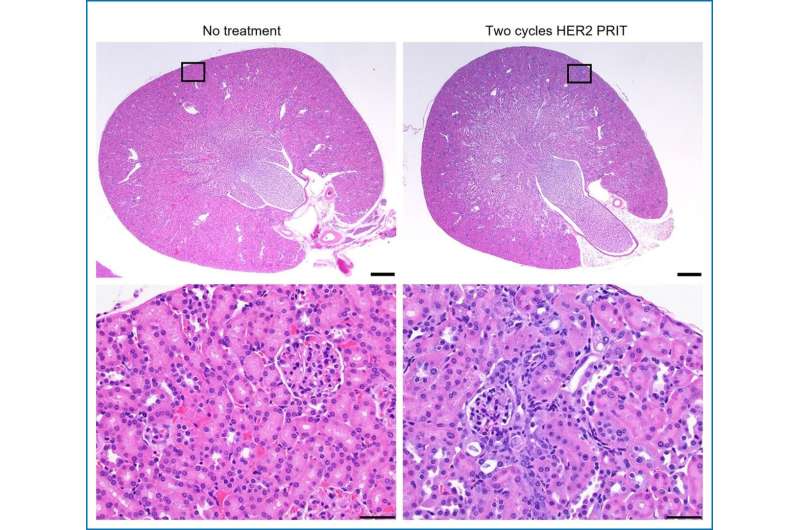This article has been reviewed according to Science X's editorial process and policies. Editors have highlighted the following attributes while ensuring the content's credibility:
fact-checked
peer-reviewed publication
trusted source
proofread
Nuclear medicine treatment cures lethal form of ovarian cancer in preclinical setting

A new 225Ac-DOTA-based pre-targeted radioimmunotherapy (PRIT) system has been shown to cure a highly lethal form of advanced intraperitoneal ovarian cancer in a preclinical setting with minimal side effects. Targeting the HER2 protein, which is commonly expressed in ovarian cancer, the therapy (anti-HER2 225Ac-PRIT) is a potential treatment for the otherwise incurable disease. This research was published in the Journal of Nuclear Medicine.
Epithelial ovarian cancer is the most lethal ovarian cancer and frequently presents as advanced-stage disease, such as peritoneal carcinomatosis, where disease has spread throughout the peritoneal cavity. Advanced-stage disease is associated with a poor prognosis and a five-year overall survival ranging from 18 to 46 percent. Most patients die because of extensive peritoneal disease burden and malignant bowel obstruction.
"Due to the explosion of immune and targeted therapies in the past few decades—particularly those targeting HER2—there is increasing interest in the potential role of alternative, more innovative therapies to cure epithelial ovarian cancer," said Sarah M. Cheal, Ph.D., of the Molecular Imaging Innovations Institute in the Department of Radiology at Weill Cornell Medical College in New York, New York.
"In this study, we adapted our PRIT system to target HER2 in epithelial ovarian cancer and explored whether this could effectively treat the disease without significant toxicity."
The preclinical study included five groups of eight to 10 nude mice, each bearing peritoneal carcinomatosis tumors. Two groups of mice were treated with either one or two cycles of anti-HER2 225Ac-PRIT; the other groups received alternative or no treatments and were used as controls. Weekly weights and tumor progression were monitored for up to 154 days.
Tumors spread rapidly in untreated mice, leading to a median survival of approximately four months. When treated with one or two cycles of anti-HER2 225Ac-PRIT, however, median survival was not reached after 154 days. At the end of the study, 75 percent of mice in the anti-HER2 225Ac-PRIT treatment groups were confirmed to be clinically cured. All treatments were well tolerated by the mice.
"In this study we achieved high potency with anti-HER2 225Ac-PRIT while maintaining an acceptable safety profile. These findings suggest that when scaled to human patients, we can achieve curative tumor radiation-absorbed doses without major normal organ toxicity" stated Steven M. Larson, MD, of the Department of Radiology at Memorial Sloan Kettering Cancer Center in New York.
"Furthermore," stated Nai-Kong V. Cheung, MD, Ph.D., of the Department of Pediatrics at Memorial Sloan Kettering Cancer Center in New York, "since DOTA-based PRIT is modular it can be adapted to other cancers and next generation PRIT using SADA (Self-Assembling DisAssembling Antibody) with potential for broad applications for compartmental (e.g. peritoneal) as well as systemic theranostics in oncology."
More information: Sebastian K. Chung et al, Efficacy of HER2-Targeted Intraperitoneal225Ac α-Pretargeted Radioimmunotherapy for Small-Volume Ovarian Peritoneal Carcinomatosis, Journal of Nuclear Medicine (2023). DOI: 10.2967/jnumed.122.265095




















